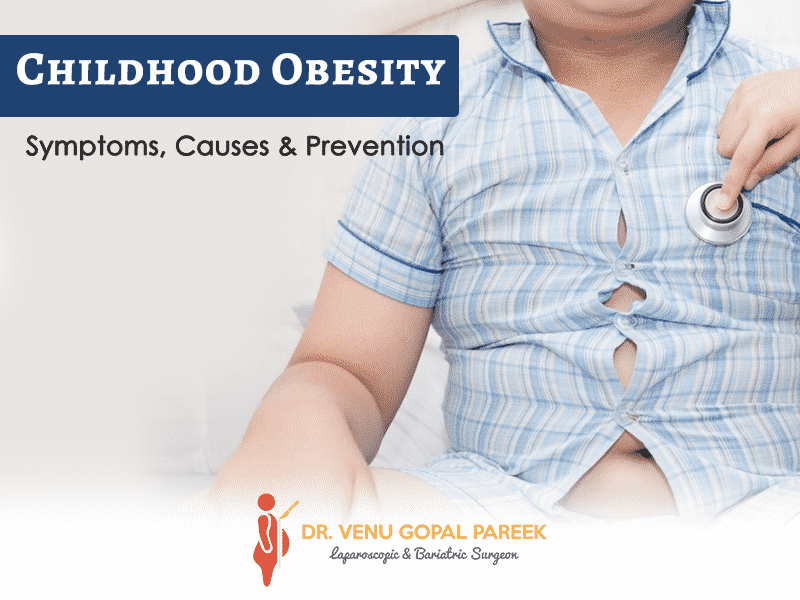
Childhood Obesity – Symptoms, Causes and Prevention
Pediatric or childhood obesity is one of the most prevalent nutritional disorder in most children and adolescents worldwide. Childhood obesity has reached to its epidemic levels in both developed as well as developing countries. Overweight and obesity in childhood shows adverse impacts on both physical and also psychological health.
Obesity in children has become a major health concern in the developed world. The National Health and Nutrition Examination Survey stated that the prevalence of obesity is increasing day by day in all the pediatric age groups. Recent studies say that nearly 43 million people are suffering from obesity and among them 21–24% of children and adolescents are overweight, and 16–18% of people are having abdominal obesity.
Obesity and overweight children stay obese in their adulthood and increase the risk of getting heart diseases at a younger age. Childhood obesity increases the chance of developing type 2 diabetes, hypertension, liver and kidney diseases, stroke, and joint diseases like osteoarthritis, knee pain and lower back pain and can also cause reproductive problems in adults.

Symptoms Of Childhood Obesity
The symptoms will vary from child to child but some of the most common symptoms include:
- Appearance: Stretch marks on the abdomen and hip areas, dark & velvety skin (acanthosis nigricans) around the neck and in other areas, deposition of fat in the breast area.
- Pulmonary: Shortness of breath, sleep apnea
- Gastroenterological: constipation, gastroesophageal reflux
- Orthopaedic: Flat feet, knock-knees, dislocation of the hip
- Reproductive: Early puberty and irregular menstrual cycles in girls, delayed puberty in boys, genitals might appear inappropriately small in males
Causes Of Obesity
The exact cause of obesity is not fully understood and it is considered to be a disorder with various causes which include environmental factors, lifestyle preferences, medical factors and food habits rising the prevalence of obesity worldwide.

Over 90% of obesity problems are idiopathic and nearly only 10% are associated with hormonal causes and genetic. Obesity occurs if our body consumes extra calories than it burns.
Diet: Eating high-rich foods but nutrient poor i.e junk foods and fast foods can increase the weight of your child.
Lack Of Physical Activity: Spending more time in front of the television or computer, playing video games and not spending time on physical activities like playing, exercising etc., more likely increases the chance to gain weight.
Psychological Factors: Personal, parental and family stress can also increase the risk of obesity in children. Some children eat more to cope up with the problems or to deal with their emotions like stress or to fight against boredom increase risk of obesity.
Genetic Factors: If any of the family members are obese then your child is at risk of getting obesity. However, genes do not necessarily mean a child is intended to be overweight there are several preventive tips to lower the risk of obesity.

Medications and Medical Conditions: Usage of steroids and Antidepressants drugs, Prader-Willi genetic syndromes, and hormonal conditions like hypothyroidism can also cause obesity.
Preventive Tips
Whether your child is at the danger of becoming overweight or is currently having a healthy weight, you need to take some measures to keep things on the right track.
- Restrict or avoid your child’s consumption of high-calorie sugar-sweetened beverages & foods
- Maintain a healthy diet and level physical activity of your child
- Provide more fruits and vegetables to your child
- Limit eating fast-food, teach how to make healthier choices
- Avoid prolonged sitting in front of a TV or computer
- Make sure your child gets enough sleep
As many factors contribute to pediatric or childhood obesity, which is a multisystem disease that potentially shows several complications. So the attention of a healthcare professional is compulsory. Approach a doctor at least once a year and take proper advice to gift an obese free lifestyle for your child.
About the Doctor:

Dr Venugopal Pareek – Bariatric Surgeon Dr Venugopal Pareek is one of the best Laparoscopic and Bariatric Surgeon in the city has done more than 9000 surgeries in 12 years. Trained in the esteemed Nizam’s Institute of Medical Sciences in Surgical Oncology, Dr Pareek has the expertise in Bariatric Surgeon. He has attended several conferences and published articles on medicine as well in various national and international journals.






